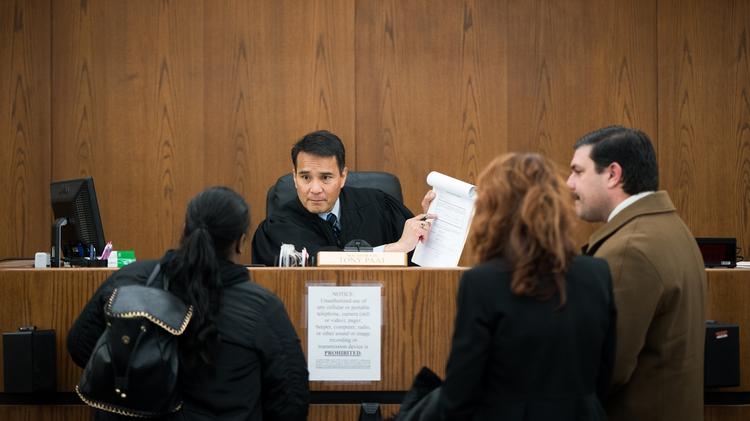Tenants: On The Edge Of Eviction? Paying Rent comes First!
Every morning for weeks, This Tenant made the same phone call: To see if that day was the day she’d be evicted from her home.
She faced eviction because she couldn’t pay rent on her three-bedroom apartment, she lived where many of the city’s poorest residents live.
It can sometimes take weeks before the marshals actually show up at your door, and she fully expected to be homeless any day!
“And it’s like really scary,” the 28-year-old said. “I try so hard not to cry. Like, I would be like, ‘Oh my God, if they come today, what am I gonna do?’ ”
I first met Limes outside the courtroom of the Landlord and Tenant Branch of the Superior Court, where tenants go when they’ve been sued by their landlords for not paying rent.
That day, a judge ordered a writ of restitution — directions for the marshals to begin eviction proceedings.
Limes wore a black apron and purple shirt with the logo of a local grocery store where she works part time. When the judge asked why she owed more than $3,300, Limes said she was struggling to make ends meet.
“And basically he was like, ‘So the only reason why you’re behind on rent is because you can’t pay rent?’ And I was like, ‘Yeah, that’s the only thing,’ and he was just looking at me like, he said, ‘We’ll send out a writ,’ ” Limes recalls. “And I was just like, ‘Wow, like, is there any way I can get some help?’ ”
Limes is among the hundreds of thousands of Americans who face eviction because they simply can’t afford their rent. One in four low-income families pays more than 70 percent of its income on rent, leaving little money for other bills and almost no room for an unexpected expense.
According to the Harvard Research Center’s State of the Nation’s Housing report in 2018, rising rents and stagnating wages nationwide have contributed to a record number of cost-burdened renters — a situation that is worsened by the shortage of affordable housing for low-income tenants.
For many Tenants, Living On A Tight Margin is hard
Limes lives with her 4-year-old son and 8-year-old daughter. Her ailing father had been living with her, too, until he died recently.
“I also have my niece. She’s 18 and she’s been going from house to house,” Limes says. “So I told her just come stay with me until she get on her feet.”
Their apartment feels like someplace people are just passing through, with empty walls and plastic bins stuffed with clothes on the floor.
Limes is pretty typical of those who end up in rent court: She’s a single mother, juggling things on her own. She says the father of one of her children is in prison and the other is a deadbeat dad. She lost a full-time job last October; her new job is only 20 hours a week. At $10.50 an hour, that’s not nearly enough to cover her $1,275 monthly rent.
“They’re living on a very tight margin,” says Judge Judith Bartnoff, who presides over the D.C. court that includes the Landlord and Tenant Branch. “And if something happens, if somebody gets sick, if somebody gets hurt, if somebody loses their job, then it throws the whole system off.”
She thinks many of the thousands of tenants who come before the court each year can afford their rent at some point — but just barely.
Tenants help pages: learn your rights in any eviction
Eviction Means Losing More Than Just A Home
The hallway outside the landlord tenant courtroom is routinely packed with renters who are trying to work out deals with their landlords’ attorneys. Some offer payment plans so a tenant can catch up, but many renters just agree to move out. Or, like Limes, they resign themselves to eviction, which can make things worse.
“It really drives people deeper into a state of hardship,” says Matthew Desmond, a Harvard sociologist who spent more than a year following low-income renters and landlords in Milwaukee that he details in his new book, Evicted.
Desmond says evictions are not just a result of poverty but a cause. It makes lives more unstable. People don’t just lose their homes in evictions, he says.
Modern Rent Parties Highlight The Need For Affordable Housing
“But you often lose your neighborhood and your school. Children often have to switch schools and miss long stretches,” he says.
Families often end up in areas with more crime and poorer-quality housing, Desmond adds.
Limes says she is worried about that. She wants to move, but even studio apartments are $800 a month, which she can’t afford.
“It’s like I’m stuck here. I don’t know where else to go. I don’t want to go to the shelter. I’m trying to get help. But I can’t find help anywhere,” she says.
She did get some temporary aid from the city a few years ago, but permanent housing assistance is almost impossible to find. Limes applied eight years ago for housing vouchers to help cover her rent.
“And nothing. I’m still what, 1,000 something,” she says.
The way we see it: For many developers the game of adding affordable housing is for Taxes and some considerations to build in areas of cities all over America.
If the Gov’t wanted they could set aside, buy and build areas for affordable living but in time the would become slums like other housing existing all over the country. New York, DC, Seattle, and other areas where good intentions gave way to the bad elements. There are Families that need help, Good hard working single moms that were abandoned by their Baby Daddies, I will not blame it on anything other then Education! I was taught about money, Working hard at a job, when the time was right putting in my leave or Quitting and finding another paying more and moving up. Many dont know this? or Schools never taught this? either way, they get locked into looking for help and assistance and back we are at Housing.. Make housing , Set rents lower and lock in these rates for 5 years at a time, in those 5 years teach these people about money, a requirement for living in these homes, apts. and at the end move them to the next with a little higher rents to be paid and by now they should have a savings acct, hopefully 2 working adults contributing to the Family Dynamic……………
No Homeless Shelter … For Now
Five weeks after my first visit with Limes, furniture was piled on the curb outside her apartment complex. There were mattresses, CDs, a flat-screen TV. Two other families had been evicted that day. But Limes was still waiting, worried that she and her kids would end up back in the city’s homeless shelter where they were in 2012.
“It was hard, and it’s like it was disgusting. And I don’t want to put my kids in that situation again,” she says.
A week later, Limes got a reprieve — but only a temporary one: She received her earned income tax credit check from the IRS and was able to pay off what she owed.
She still has to worry about next month’s rent.
Tags: Eviction Information, Tenant Information







 In an apartment building, your landlord must:
In an apartment building, your landlord must:















